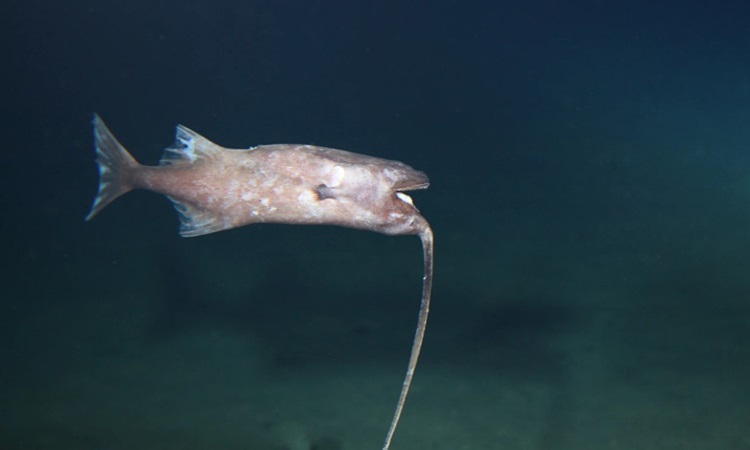The unusual swimming posture may help the whip-nosed lanternfish catch larger and faster prey without accidentally biting itself.
Lanternfish swims upside down underwater. Video: Phys.org
Video evidence from the deep sea shows that some species of lanternfish spend their entire lives upside down, according to Pamela Hart, an associate professor at the University of Alabama who studies extreme fish. The behavior, described in the journal Fish Biology, is beyond scientists’ imagination, Phys.org reported on November 22.
The whipnose lanternfish is a small fish with a fishing rod-like appendage on its face. While its body is no larger than a house cat, it has a spine that protrudes from its nose and is four times its body length. The lanternfish tricks other fish with bioluminescent bacteria that live on the tip of its lure.
For nearly a century, scientists assumed that whipnosed lanternfish dangled lures in front of their faces, as many of their shorter-armed cousins do. But new footage from underwater missions in the Atlantic, Pacific, and Indian oceans shows the fish spending their days swimming upside down, dropping long lures toward the seafloor. The footage confirms a visual observation made more than 20 years ago, Stewart said.
In 1999, a remotely operated vehicle (ROV) encountered a whipnose lanternfish floating motionless, belly up, in the waters between Hawaii and California. Researchers suspected it was targeting prey on the seafloor, but could not rule out the possibility that it was simply an individual acting unusually.
In one video taken near the Izu-Ogasawara Trench off the coast of Japan, a whipnose lanternfish drifts with the current, its body parallel to the seafloor, its mouth wide open, revealing hundreds of tiny teeth. Suddenly, it makes a sudden movement, using its powerful tail to swim in tight circles. Eventually, it calms down and continues drifting, then crashes into the ROV's lighting equipment. It then uses its small side fins to retreat into the darkness. In other videos, the propellers and engines of the submarine cause the lanternfish to somersault and swim belly down, but they quickly return to the backstroke position.
The researchers believe that the backstroke position may make the whipnosed lanternfish more dangerous. They suspect that by keeping the lure farther away from its mouth, the lanternfish can take down larger, faster prey without accidentally biting itself. Stewart once encountered a whipnosed lanternfish specimen with a giant squid carcass in its stomach.
An Khang (According to Yahoo )
Source link



![[Photo] Unique folk games at Chuong Village Festival](https://vstatic.vietnam.vn/vietnam/resource/IMAGE/2025/4/10/cff805a06fdd443b9474c017f98075a4)
![[Photo] April Festival in Can Tho City](https://vstatic.vietnam.vn/vietnam/resource/IMAGE/2025/4/10/bf5ae82870e648fabfbcc93a25b481ea)

![[Photo] Opening of the 11th Conference of the 13th Party Central Committee](https://vstatic.vietnam.vn/vietnam/resource/IMAGE/2025/4/10/f9e717b67de343d7b687cb419c0829a2)

















































































Comment (0)